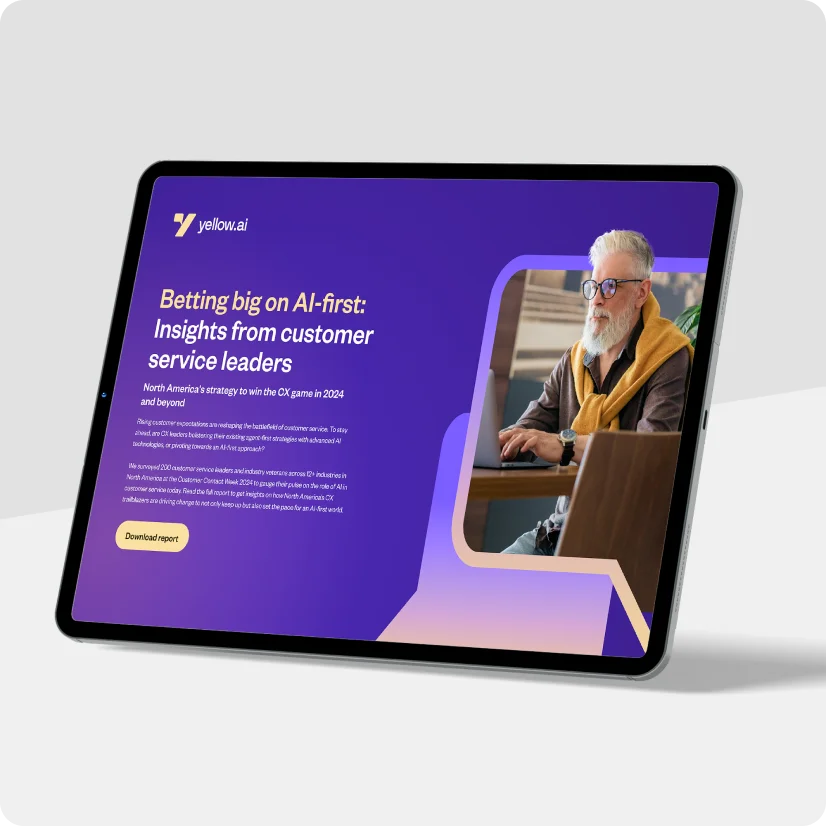We are already witnessing the technological geniuses sweeping the healthcare sector. Moving past the fascinating robotic surgeries, we are now in a space where artificial intelligence or AI is the buzzword in this industry. Its influence is all-pervasive, from formulating personalized treatments for critical health conditions like cancer and several other diseases to pioneering realistic medical simulations for immersive training of medicos, healthcare professionals and business owners. These are just a few examples of massive transformation spurred by generative AI in healthcare. It is merely the beginning. As this industry continues to evolve, embracing the cathartic power of generative AI, we will experience a paradigm shift, resulting in an inclusive healthcare system accessible to everyone, irrespective of financial or social status. This blog will take you through several dimensions of generative AI in healthcare and study its top use cases and prospective predictions. Whether you’re a medical professional, healthcare facility owner, patient, or inquisitive about this sector’s future, get ready to learn about the revolutionary prowess of AI.
What is Generative AI?
Generative AI might appear as the latest technological boon taking the world by storm, but it has existed for almost a few decades. Precisely in late 2022, its introduction to the general public made it hog the limelight. Thanks to this move, all of us have now used Gen AI in some or the other form in our day-to-day lives. But do you know what Generative AI is? Let’s simplify its meaning to make it biteable information. It is a subcategory of artificial intelligence. ChatGPT is an example of Generative AI, but the latter is a vast field of AI. It is skilled to generate or create an array of content ranging from text, pictures, graphics, videos, audio, etc., employing generative models within a blink of an eye.
Generative AI models gain insight into the structure and trends of the training data they are given and then produce new data that is similar. Recent advances in user interface design have made it possible to generate high-quality content and responses in a flash. To define it in simple words, Generative AI means the use of artificial intelligence to generate a wide range of new content relevant to different fields.
The incredible outcomes of this AI tool have made it a preferred choice for various industries to integrate into their systems. Its emergence in the medical sector was bound to happen. In healthcare, generative AI uses deep learning and ML algorithms to sift through unstructured data, including medical imagery, audio clips of consultations, and patient health records, to generate new material comparable to the training data.
Generative AI in healthcare: Top use cases
With a predicted CAGR of 35.14 % from 2023–2032, the worldwide market for generative AI in healthcare is estimated to surpass USD 21.74 billion by 2032.
One of the most cumbersome aspects of healthcare is its massive amount of unstructured data consisting of diagnostic images, clinical notes, medical reports, recordings and charts. However, the people associated with this field witnessed a significant breakthrough in April last year. A new generative AI technology, powered by GPT-4, showed thousands of Chicago convention center attendees how a healthcare clinician might utilize new platforms to transform a patient contact into clinician notes in seconds. For the unversed, GPT-4 stands for the most recent iteration of the chatbot’s foundational large language model (LLM). Healthcare facilities are attracted by LLMs’ ability to write clinical notes, assist doctors with diagnosis and treatment, and fill out onerous papers for reimbursement or discharge.
Microsoft discussed LLM integration with Epic, a prominent EHR software supplier, in early 2023. Due to their collaboration, initiatives are underway at UC San Diego Health and Stanford University Medical Center in California. It was followed by Google’s partnerships with the Mayo Clinic and Amazon Web Services, launching HealthScribe, a Gen AI clinical documentation service. To develop new drugs, Bayer Pharmaceuticals is looking into generative AI solutions such as Med-PaLM 2 and Google Cloud’s Vertex AI. HCA Healthcare and Google Cloud are employing generative AI to help doctors and nurses with administrative tasks.
It might be news for many that some LLMs excel in healthcare. According to Microsoft researchers, GPT-4, which has no medical expertise, can pass the US Medical Licensing Examination. A survey indicated that clinicians preferred GPT-4 clinical notes to physician ones. Studies have also shown that LLMs can diagnose difficult situations and translate complex surgical permission documents into patient-friendly language.
In late 2023, US President Joe Biden signed an executive order on AI that ordered the US Departments of Health and Human Services and Veterans Affairs to investigate how to integrate AI in healthcare securely.
Generative AI in medical imaging
Since its foray into medical imaging, Gen AI has been doing incredible feats. One of its several applications is generating synthetic medical images. It works to train AI models on existing scans to produce realistic, anonymized data for research and training, minimizing patient exposure to radiation. These result in accelerating clinical trials.
Blurry or low-resolution images of scans and reports are becoming things of the past. Gen AI has been significantly improving image quality, leading to early and more precise disease detection. Another use of generative AI in medical imaging is personalizing surgical planning. Now, healthcare professionals are able to design accurate pre-operative planning and better surgical results, thanks to the 3D models of organs and blood vessels generated by AI based on individual patient data.
Generative AI in drug discovery and development
Design and testing have been a constant effort in medical science drug discovery. The use of Generative AI in this realm has accelerated the process. The researchers can now analyze large molecular structure datasets and identify promising drug candidates. This is helping to speed up the process of developing new drugs and getting them to patients more quickly, which can save lives.
Successful discovery of drugs isn’t enough. One must predict the drug’s efficacy and safety confidently. This is when Gen AI comes in handy by simulating how potential drugs will likely interact with human cells and tissues. Such breakthroughs drastically reduce the danger of adverse side effects in clinical trials. Personalized drug development and administration are other areas where this technological tool is doing wonders. Healthcare providers may customize treatment plans and medication doses according to patients’ unique DNA profiles and reactions.
Generative AI in personalized medicine and treatment plans
The one-size-fits-all approach in medical care has been gradually fading away. The realization, for example, that even patients who have diabetes need a rather individualized way of treatment has given room to generative AI to enter personalized medicine and treatment plans. This modality applies to every health condition. Utilizing Gen AI, one can now analyze patient data and predict clinical outcomes. It has been proven effective in identifying patients who are at risk of specific diseases or complications. It gives a chance to take preventive measures and implement targeted interventions.
Gen AI in healthcare can provide customized treatment regimens by examining a patient’s genetic composition, medical history, and reaction to prior treatments. Current therapy techniques are also optimized. It achieves this by enhancing the efficacy of current treatment programs by investigating massive databases, including patient responses.
Personalized healthcare is a conversation away

Generative AI in medical training and education
Since its formation, studying medical science has been one of the toughest tasks. We all know that the human mind grasps even a complex concept much faster when imparted in an immersive AV format. The intervention of Generative AI in healthcare is doing this job by generating realistic medical simulations for aspiring medicos. One of the examples is the creation of virtual patients with particular diseases and symptoms, facilitating medical students and working professionals in the field to practice diagnosis and treatment in a safe, controlled environment.
Think about how great it would be if you could practice surgery on a virtual operating table while experiencing what it’s like to be a patient. Similarly, it might entail going through intricate procedures as many times as necessary before entering an operating room.
As mentioned above, Gen AI is also revolutionizing medical education. Understanding individual student’s strengths, weaknesses, interests and grasping power, it is tailoring study materials, training programs and simulations to each student’s needs and learning styles. Such developments resulted in faster and more effective learning.
One of the significant challenges burdening the healthcare system is the manual medical report generation and data storage. It has been taxing the professionals working in this field. The use of Gen AI in healthcare has appeared as a welcome change as it is automating many such tedious jobs. Healthcare providers may reclaim precious time for patient care with the help of this tool’s effortless ability to produce accurate and comprehensive reports. With AI taking care of administrative tasks, doctors now have more time to engage with patients and less time to fill out paperwork.
Challenges and ethical considerations
The benefits and advantages of Generative AI in healthcare are immense. Nevertheless, using this AI tool isn’t free of challenges and danger. Often, data privacy and security concerns surface as the most pressing issues. Thus, those using Gen AI in this sector must address such potential setbacks. Meanwhile, another shortcoming emerges about its ethical considerations. Additionally, it is critical to ensure clinicians embrace the system and integrate well with current healthcare workflows.
Due to its many advantages, LLMs have the potential to become an integral part of medical treatment quickly. However, they aren’t always easy to assess, and if the service isn’t making money, it might be changed or even removed without warning. Patients’ treatment, privacy, and security might be jeopardized in the event of such an incident.
Future trends and predictions in healthcare
By observing its present positive outcomes, it is safe to state that the future of Generative AI in healthcare is shining with possibilities. As time goes by, we can expect further advancements in this sphere.
Among many probabilities, one may anticipate the introduction of Gen AI-powered robots in this industry. They will assist surgeons in complex surgical procedures, offering precision, personalized rehabilitation therapy, and faster recovery. Many also perceive them to appear as companionship to patients undergoing such surgeries and treatments.
AI-driven drug manufacturing is another possible outcome. As a game-changer in customized medicine, it will play an integral part in adjusting pharmaceutical doses and delivery systems right at the point of care. Generative AI seems promising to improve not just people’s physical well-being but also their mental health. To this end, it will develop virtual companions to help people overcome feelings of isolation and despair and offer individualized treatment approaches.
Nevertheless, Gen AI integration in healthcare demands a solid digital foundation, targeted human investments, and data preparation. To maximize human productivity, institutions must restructure work and employment responsibilities. Improved healthcare access and outcomes necessitate physician and patient awareness.
Benefits of harnessing generative AI with Yellow.ai in healthcare
Yellow.ai has been a pioneer in leveraging the power of generative AI in several industries. Many businesses are already reaping the benefits of it, be it in better customer experience and engagement, analyzing data or increasing productivity, among others. If you belong to the healthcare industry, you may take Yellow.ai’s help in employing Gen AI.
No code chatbots
By using Yellow.ai’s Dynamic Automation Platform (DAP), you can build no-code chatbots that can help the patients or users of your healthcare system engage and interact better.
Automate workflow
Using Dynamic Conversation Designer, featuring a user-friendly interface, you can build voice bots and AI chats to automate workflows powered by Generative AI.
Real-time conversation workflows
We design real-time conversation workflows and replies with generative AI. In response to client input, our runtime flows evolve as needed. Preset routines and complex configurations don’t govern us. By automating configuration, enterprises save time. Conversations feel more organic and genuine for users.
Automate user interaction
Our YellowG Zero setup can automate nearly 90% of customer interactions. This drastically cuts down the workload of human agents and results in better response time.
Assured and enhanced security
The use of Gen AI in healthcare raises the question of data privacy and security. With Yellow.ai, you can be rest assured about safety. We are backed by ISO, HIPAA, SOC2, and GDPR certifications and are thus built to meet the highest security standards and compliance needs.

Conclusion
Generative AI in healthcare isn’t a sci-fi fantasy. It is for real and has proved its mettle as a palpable force, metamorphosing the industry. While still in its budding stages, this AI technology is expeditiously transforming the medical ecosystem. Generative AI can potentially minimize the amount of time spent on administrative tasks, customize the treatment of patients, better the overall efficiency of the healthcare system, and ultimately save millions of lives with timely diagnosis and treatments. With Gen AI’s continued development, the healthcare sector might undergo a radical transformation beyond anything we’ve witnessed with existing technologies. Once it reaches maturity, it may blend with other futuristic innovations like virtual reality, AR and different types of AI.



























